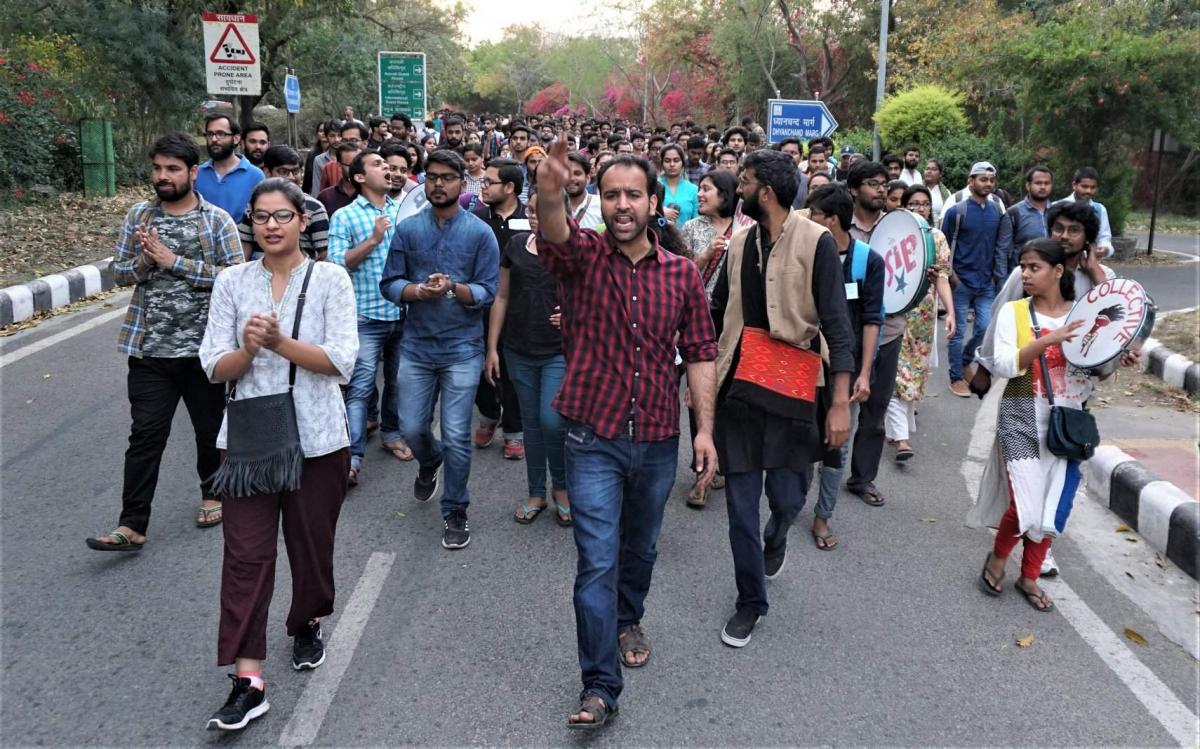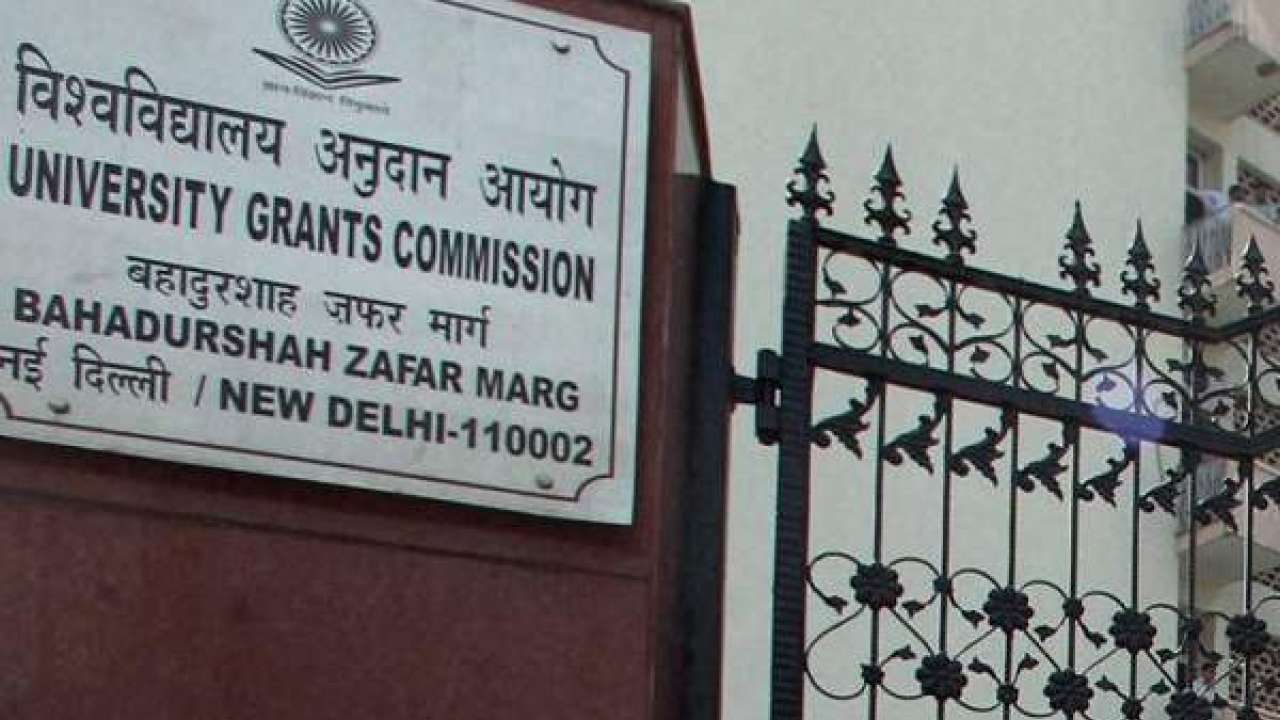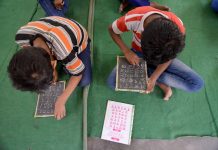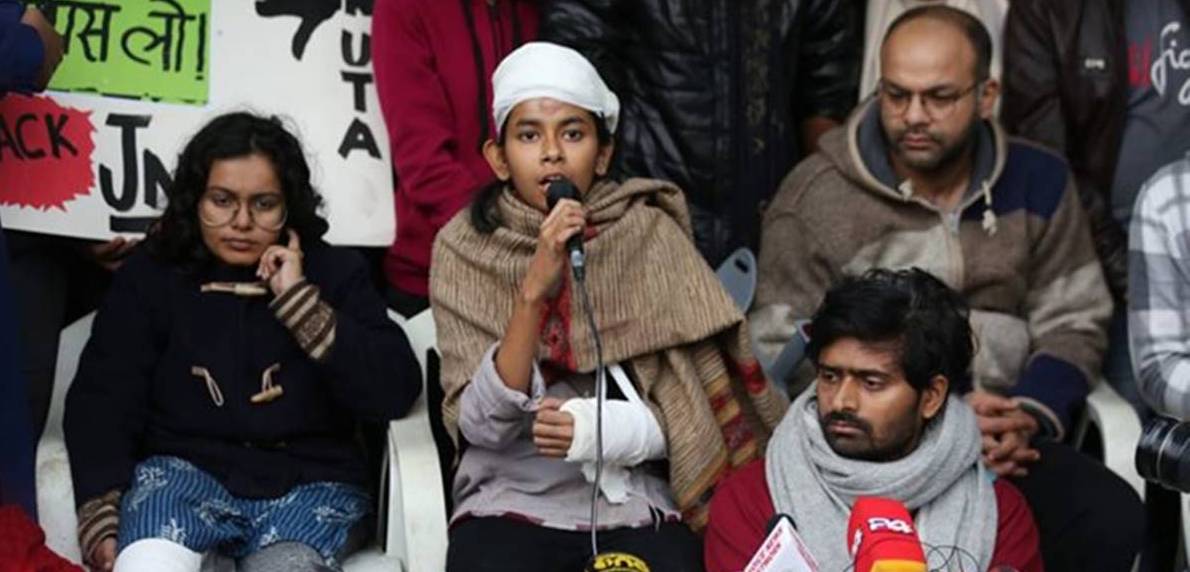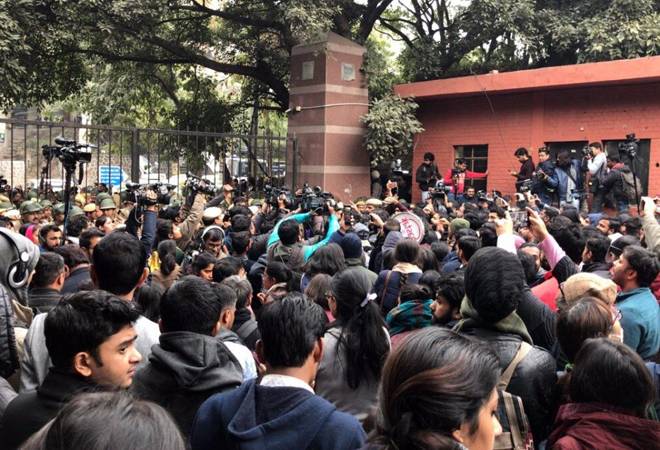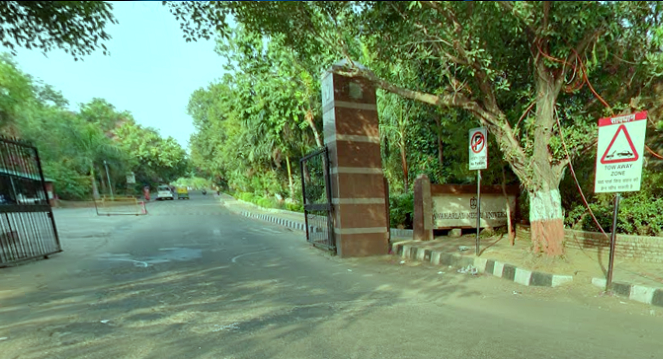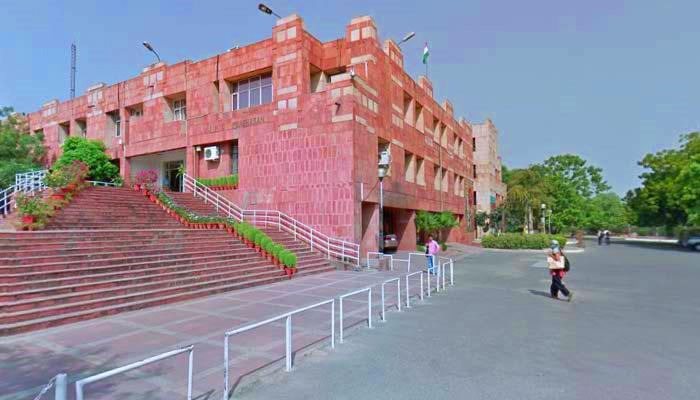The administration of the Jawaharlal Nehru University (JNU) held its 283rd Executive Council (EC) meeting on the 13th of November. Students from JNU have been protesting against the draft hostel manual for almost four weeks now. The manual stipulates regressive measures regarding curfew timings, dress code, heavy fines and rustication of students for participating in protests, deletion of the provisions regarding reservations for Scheduled Castes, Scheduled Tribes, Other Backward Classes, and People with Disabilities as well as perhaps the most contentious issue regarding the hike in hostel fees. The EC has announced several changes to the hostel manual related to the provisions regarding curfew timings and dress code, which have now been deleted, as well as regarding the hostel fee charges. However, the provision regarding reservation of hostel seats for marginalized students has not been reinstated. Most recently, a committee was set up up by the Ministry of Human Resource Development (MHRD) to act as a mediator between the students’ representatives and the JNU administration.
The administration seems to have partially buckled under the pressure of sustained students’ protests which have also garnered considerable media attention. It has introduced a fifty percent fee waiver for all students belonging to the below poverty line (BPL) category in matters of the room rent, plus the utility and service charges. The utility charges refer to the actual stipulation of water and electricity consumption while the service charges refer to the expenses incurred in paying mess workers, sanitation workers, and other supporting staff in the hostel. These new charges occur in addition to the mess bill of students, which hovers around three thousand rupees per month currently. The overall monthly expenditure of each student is likely to increase by at least two to three thousand rupees, excluding the expenditure incurred by students in buying books, photostat materials, stationery, and other life expenses. This brings the average monthly expenditure of a student close to around eight to ten thousand rupees a month. Even with the fifty percent fee waiver for BPL category students (which, it should be pointed out, the JNU administration currently has no clarity regarding its definition and identification), this average expected monthly expenditure is far above what the JNU administration grants in terms of scholarships to the BPL category students.
The merit-cum-means (MCM) scholarship, stipulated to be granted to students in their Master’s and Bachelor’s degrees whose familial income is less than two lakh fifty thousand rupees per annum, has been fixed at two thousand rupees per month for a long time. The administration’s priorities are brutally clear here— it has not considered important to increase the MCM scholarship for poor students while at the same time pointing towards the supposedly ‘unavoidable’ increase in the hostel fee for everyone.
Sense of Bafflement about Student Protests
The administration is quite concerned and even baffled as to why students in JNU have decided to continue their protests despite announcing a fifty percent fee waiver for BPL students. This sense of bafflement is seemingly shared by many observers of the students’ protests in the media as well. Arguing that the state should not subsidize the education of poor students in such higher education institutions, and against the idea of free and equal public education in general, many have come up with alternative proposals which attempt to solve the main contention of the fee hike while conceding some concern for poor students. M Saraswathy has argued for the creation of an alumni network to create an endowment fund towards facilitating the education of the poor students, while Indrajit Hazra has appealed to “angel investors” (a technical economic term for such investors who specialize in funding start-ups) to sponsor the hostel accommodation of poor students in JNU. Hindustan Times, The Economic Times, and The Financial Express have detailed how despite the fee hike in JNU, its hostels are nonetheless among the cheapest in India, with the The Financial Express even bemoaning that it was “shocking that [JNU] authorities didn’t hike fees for so long”.
A ‘user-pay’ model where the actual operative costs in running the hostels is recovered from all students along with partial concessions or in some cases a total exemption from payment of any charges for appropriately defined and identified poor students is thus commonly envisaged as the corrective for JNU and indeed for other universities in the country with regard to the issue of fees.
There are many questions that could be raised here in response to the alternative solutions being proffered towards ending the stalemate between the agitating students and the JNU administration. This article, however, concerns itself with the problem of students’ poverty that has been only reluctantly but surely rhetorically addressed by the JNU administration through its fifty percent fee waiver for BPL students. The problem can be formulated as follows— what understanding of students’ poverty is revealed in the JNU administration’s decision of the fee hike, especially with regards to the fifty percent fee waiver offered to BPL students? Since a similar understanding of students’ poverty seems to be shared by many observers of the protests in the media and elsewhere, it is important that we analyze it in its barest essentials and presuppositions. This, it shall be claimed, also explains the bafflement of many, but especially the JNU administration, at the continuance of the students’ protests, in spite of their declaration to “take care of the students coming from weaker sections” on the question of the fee hike.
Depoliticizing Student Poverty
A common argument which surfaces in the context of publicly funded education in general and the fee hike in JNU in particular is that all those who are capable of paying should bear the full costs of their expenses in the university. Only those who are unable to bear these costs should be granted some form of financial assistance, in the form of scholarships, freeships, concessions, sponsorships, exemptions, etc.
With reference to such an argument, it is important to ask the following question— who is it exactly who pays in all such situations?. Who faces the costs of the educational and living expenses of those students who are termed as being capable to pay? The first, and seemingly obvious answer to this question, is that it is the students’ parents or family (the father in most situations) who are responsible for paying the costs of the students’ educational and living expenses in the university. The student exists in a dependent relationship with their parents when it comes to covering the costs of an education. In all such instances where the parents are unable to cover the costs of their children’s education, the students themselves are forced to fend money for their educational and living expenses. Tutoring school and college-going students is something that a lot of university students do towards trying to covering for their living costs in the situation of inadequate financial assistance from one’s family or the institution in question.
It is quite straightforward that such a situation constitutes a state of unfreedom for all such students who cannot depend upon their families for financial assistance. In fact, poor students in turn assist and contribute to their families’ incomes with their scholarships and fellowships. Universities across the world have tried but failed to come up with any socially just solution which both relieves the parents from any obligation of financial assistance to their children while making the students themselves responsible for the costs of their higher education.
A highly lucrative, but in no way socially just or sustainable, solution to this problem is the policy of ‘student debt’. Burdening the students themselves with debt for incurring the costs of increasingly expensive higher education has been found to be the only way where the state, the higher education institutions, as well as any familial or other ties are relieved of any sense of obligation towards the costs of students’ higher education. It is important that we understand how the fee structures of even public universities like JNU suffer from the myriad problems created out of not sufficiently paying attention to the phenomenon of parental or familial dependence of the students for their educational needs. As pointed out earlier, this relation of dependence is not only the most acute for the poor students but is in fact turned on its head for them, whose families are in turn dependent on their earnings for sustenance. In such situations, the poor students, with or without a scholarship and/or fellowship, are forced to work a job while continuing to study. Such a state of compulsion is absent from the lives of non-poor students. It is obvious that the time spent in working a job is likely to have negative consequences on the students’ academic performance, revealing the crushing adversity of the conditions in which poor students experience their educational journeys.
This state of unfreedom as experienced by poor students occurs on a social and not merely a familial register. The JNU administration, by seeking to ameliorate the problem of student poverty by devising a separate category of the BPL students calculated through parental/familial income, already is a depoliticization of the issue of student poverty. It depoliticizes poverty as disconnected from inequalities accruing from the social dimensions of class, caste, gender, religion, sexual orientation, ethnicity, etc. It is not surprising that as the JNU administration has announced a fifty percent fee waiver for BPL students, it has also revoked provisions relating to deprivation points for women and reservation for SC/ST/OBC/PWD students in the hostels.
Without the background of this state of unfreedom faced by poor students, their anger and anguish over JNU administration’s decision of the fee hike cannot be sufficiently understood. Without a clear picture of this state of unfreedom and its social-psychological ramifications that poor students in most Indian universities have to live with, administrators and media observers shall be perpetually destined to remain in a state of bafflement at student protests against the prospective hike in their hostel fees.
The Importance of Self-Respect
This brings us to another aspect of the bafflement of the administration regarding the student protests which is quite revealing of their impoverished understanding of the poverty or material deprivation faced by students in Indian universities. A look at some students’ testimonies clarifies the roots of the mentality which has led many students to reject the administration’s stance on the issue of the fee hike. For instance, one student says, “A person comes to JNU for the reason that they may then take the least amount of money from their parents and continue one’s educational work through one’s own earnings. In this age, we do not want to be a burden upon our families; we want in fact to support them [emphasis added]. If the hostel fees are hiked so drastically, then neither would our families be able to support us nor would we be able to take care of our own sustenance on the campus. The most important aspect is that there are many students here who are unable to pay even the current costs of the hostels, and in the event of the fee hike, they would simply be forced to leave their education mid-way.” Another student expresses this succinctly, when she says, “hum apne dum par padhai kar rahe hai, hum ghar se paise nahi le rahe [we are studying here by our own effort, we do not ask for any money from our parents]”. One may ask here, why does a student desist from taking money from their family or parents or anyone for their education? What have been the moral and social-psychological consequences of JNU’s fee structure? What are the economic and ethical aspects of a student not desiring to be financially dependent upon their parents or anybody else?
It might be argued, as can be gleaned from the student responses recounted above, that the moral consequence of the existing fee structure in JNU is the inculcation of the value of self-respect among the students. Self-respect is the moral emotion animating the entire student resistance against the issue of the fee hike in the draft hostel manual. It is crucial to point out that the value of self-respect is subject to develop in JNU among poor and non-poor students alike, for both categories of students are made less financially dependent upon their parents or family because of the peculiar fee structure in JNU. In lieu of all such proposals which want to make the richer students pay for their own education, one should point out that even a student who belongs to a rich family is perforce allowed to learn the value of self-respect in JNU which comes from not having to rely upon parental/familial wealth for the purposes of one’s education. And it can surely be asked, why should anybody be made to rely upon parental or familial wealth for fulfilling one’s education?
Those who wish to merely concern themselves with the statistical details of the fee hike, with trying to point out that the proposed hike in fees is not 300% but actually 2900%, or with arguing that the newly proposed fee is nonetheless reasonable and fair for someone who gets to live in South Delhi, entirely miss the resilient value of self-respect among students as propelling the entire student protest.
The tuition fee structure of JNU, with Rs. 283 charged for a semester, along with a subsidized hostel fee structure, has been able to delink the issue of a student’s education with that of parental or familial wealth. This allows them a feeling of living independently with self-respect.
Indeed, scholarships and fellowships are supposed to fill in for this delinking of the student’s educational costs with parental or familial wealth, marking its absolutely vital importance for students who are then able to live in the campus with less financial worries. Some may argue that students getting such scholarships and fellowships from the state or the institution in question is also a form of dependence. However, that would be a case of false equivalence, because the students’ orientation towards a state-funded scholarship is very different from that towards parental wealth. The former leads to a creation of the feeling of self-respect in the student, while the latter infantilizes the student further into a state of dependent unfreedom. As was pointed out earlier, for many poor students, scholarships and fellowships enable them to in turn financially support their families, as marked out by the moral desire of not wanting to be a burden upon them. Such a situation for poor students’ is thus marked with a higher moral evaluation of oneself, resulting in the feelings of self-respect, responsibility, and perhaps even a little pride.
The Proposal of Cross-Subsidization
In near polar opposition to such a fee structure in JNU, which inculcates both poor and non-poor students’ moral regard for self-respect in freeing them from the contingency of parental wealth and dependence, we find the fee structure of cross-subsidization followed by an institution like the Ashoka University located in Sonepat, Haryana. This fee structure, instead of invisibly presupposing a students’ education upon parental wealth (as done by the current JNU administration), in fact wholly legitimizes and renders as central the element of parental or familial wealth in higher education.
Cross-subsidization in fees implies that the institution’s financial concessions or exemptions for poor students is enabled by the opposite and proportionate payment of fees by their non-poor peers. This self-revenue generating model of cross-subsidization is being recommended by many against the model of a free and equal model of public education such as that of JNU. In the former, the non-poor students’ parents come to “subsidize” the education of the poor students, with Monika Halan and Ishaan Gera recommending precisely such a solution to the JNU administration towards the issue of the fee hike.
Such a model may guarantee the same financial consequences for the poorest students of JNU, in, say, making them pay the same amount of fees as they are paying now while increasing it for all the non-poor students, who are supposedly able to pay towards their education. However, as was discussed earlier, even non-poor students cannot pay for their education (unless they work a job) without dependence upon parental or familial wealth. It is the non-poor parents who end up paying for their children’s educational costs. To the question as to why should parental or familial wealth be made into the most important condition for accessing an education, the model of cross-subsidization offers no answer.
Moreover, judged in moral terms, such a model of cross-subsidization is likely to generate resentment among the non-poor students while a lack of self-respect among the poor ones. The non-poor students may come to feel a bitter sense of resentment at having to fund the education of the “less fortunate” students (as they are very inappropriately described), while also making the poor students enter into a forced feeling of gratitude towards their non-poor peers. These moral consequences characteristic of private universities inhibit the fructifying bonds of friendship and solidarity among a diverse but unequal body of students, bonds which should actually be fostered in any institution of higher education.
Considering such a resentful environment among peers in classroom situations, it should be clear as to why the cross-subsidization fee structure in universities is also pedagogically harmful. Our categories themselves are hardly innocent here, for when we describe any student as being “poor” or “rich”, who are we exactly referring to, the student or her parents/family? The student herself can never be described as being “poor” or “rich” when we delink the question of their education from their financial dependence upon parental or familial wealth. Nevertheless, this delinking cannot be taken to erase the concrete benefits and disadvantages among students in JNU which accrue from unequal social capital.
The rationality of JNU’s fee structure is presupposed on the idea of an accessible public education for all. It considers the student to be in an egalitarian relationship with other students, and institutionally disregards the stigma of unequal parental wealth towards interactions and relations among the students. This also explains why such a model of higher education has also been pedagogically successful, as evidenced by the government’s own estimates in university rankings. It is in this way that the issue of the fee hike is fundamentally an issue of self-respect for each student in JNU, but more so for all such students who are made to carry the tag of being “poor”.
Ankit Kawade is pursuing his M.Phil. at the Centre for Political Studies/J.N.U.

